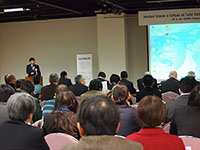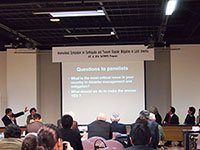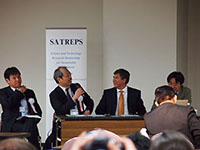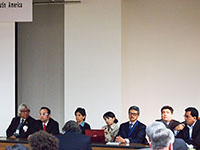SATREPS (Science and Technology Research Partnership for Sustainable Development)
https://www.jst.go.jp/global/english/
Members of the SATREPS projects in Peru and Chile organized the International Symposium on Earthquake and Tsunami Disaster Mitigation in Latin America, and invited disaster management researchers from Colombia, Ecuador, Mexico, El Salvador and Nicaragua to join them.
The symposium attracted an audience of 135 that included the ambassadors to Japan of Peru, Chile, Ecuador and Nicaragua and members of the general public in addition to researchers from each of the seven participating countries.
Dr. Yoshimori Honkura, SATREPS Program Officer (PO) for natural disaster prevention and mitigation projects, opened proceedings with a keynote lecture on Japan's earthquake disaster mitigation research and international cooperation, after which Dr. Nelson Pulido of the National Research Institute for Earth Science and Disaster Prevention (NIED) gave the main lecture on seismic activity and earthquake risks in Latin America. This was followed by country reports from representatives of the seven participating countries and a panel discussion.
Like Japan, all of the participating Latin American countries sit on the Pacific Ring of Fire, which means that they face the same risks from earthquakes, tsunamis, volcanic activity and other natural disasters. Disasters know no borders, and as a result of globalization, the effects of natural disasters on a particular region nowadays have global repercussions. Disaster mitigation initiatives have relevance beyond any single country or region, and disaster-related research will fail to generate sufficient data and knowledge unless it treats the whole world as its field.
The participants explored ways of working together and sharing the findings and lessons of the SATREPS projects in Peru and Chile with other Latin American countries, and exchanged views on future international joint research.
The panel discussion addressed the two questions of "What is the most critical issue in your country in disaster management and mitigation?" and "Is it possible to survive catastrophic natural disasters?"
Based on experiences and lessons learned from disasters in their respective countries, panel members discussed such issues as silo mentality, the tendency of memories of disasters to fade, the importance of disaster preparedness education, and the need for researchers to communicate their findings and ideas to policy makers and society as a whole.
At the end of the symposium, the participants adopted a resolution that called for 1) the elimination of divides between various stakeholders such as academia, disaster management policy makers, those in charge of implementing policies, and civil society. 2) cultivation of a mindset that sees disaster management as an investment rather than a cost, and 3) creation of networks linking researchers and other relevant parties of different countries.
The symposium ended on a successful note with participants pledging to continue to share and disseminate valuable knowledge and research outcomes through networking and cooperation between SATREPS project members in different countries.
<Links>
- SATREPS Peru Project website
http://ares.tu.chiba-u.jp/peru/E/meeting/meeting_140307.html
- SATREPS
http://www.jst.go.jp/global/english/
SATREPS (Science and Technology Research Partnership for Sustainable Development) is a Japanese government scientific diplomacy program funded jointly by Japan Science and Technology Agency (JST) and the Japan International Cooperation Agency (JICA). SATREPS works to promote both scientific advances and international cooperation through three- to five-year projects in which researchers in Japan and developing countries team up to tackle global issues.
- SATREPS project: Enhancement of Earthquake and Tsunami Disaster Mitigation Technology in Peru
(Principal Investigator: Professor Fumio Yamazaki, Graduate School of Engineering, Chiba University / Adopted in FY 2009 / Counterpart country: Peru)
http://www.jst.go.jp/global/english/kadai/h2117_peru.html
- SATREPS project: Enhancement of Technology to Develop Tsunami-Resilient Community
(Principal Investigator: Dr. Takashi Tomita, Deputy Director, Asia-Pacific Center for Coastal Disaster Research, Port and Airport Research Institute / Adopted in FY 2011 / Counterpart country: Chile)
http://www.jst.go.jp/global/english/kadai/h2309_chile.html

The symposium drew a packed audience of 135 participants.

Panel discussion

Researchers involved in the SATREPS projects in Peru and Chile, etc.

Disaster management researchers from seven Latin American countries
JST, an integrated organization of science and technology in Japan, establishes an infrastructure for the entire process from the creation of knowledge to the return to the society. For more information, visit http://www.jst.go.jp/EN/